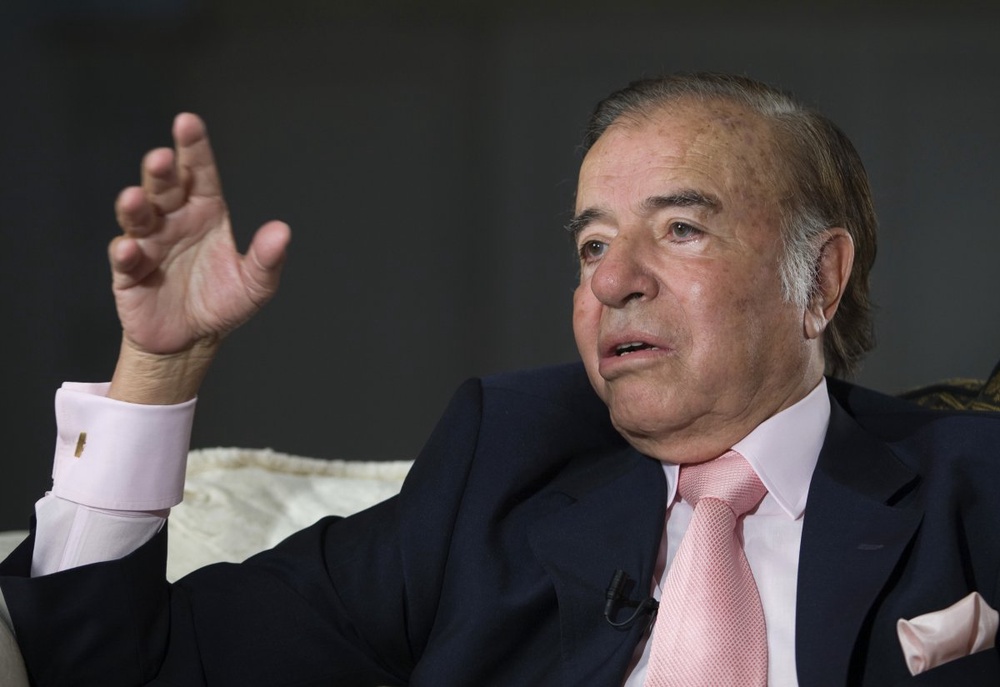
Argentina's ex-president Carlos Menem was back in court for a new trial Monday, this time for allegedly falsifying his personal tax returns, AFP reports citing the Supreme Court. Menem, 83, who was president from 1989-1999 and is still a senator, was in court with his daughter Zulema. Prosecutors maintain in this case that he was derelict in his duties as a public official and dishonest about his returns. They say Menem failed to report two bank accounts -- including one holding six million dollars -- as well as two light aircraft, stocks, cars and real estate. On June 13 Menem was sentenced to seven years in prison for organizing contraband arms shipments to Croatia and Ecuador during his tenure. But because he enjoys immunity as a legislator, the former president must first go through an impeachment process by his fellow lawmakers. If they fail to oust him from the Senate, Menem could be incarcerated after his term ends in 2017, legal observers have said. An appeals court in March affirmed a guilty verdict against Menem and his one-time defense minister, Oscar Camilion, for smuggling 6,500 tons of weapons and ammunition to Croatia and Ecuador. He was convicted of "aggravated smuggling," considered a serious offense because the crime involved war material and was carried out by government officials. The weapons were sent to Croatia in seven shipments aboard freighters between 1991 and 1995. At the time, much of the Balkans was under a UN arms embargo following the violent break-up of Yugoslavia. More arms were sent to Ecuador aboard three flights in February 1995. The country was then engaged in a border war with Peru, and Argentina was banned from selling weapons to either side as one of the guarantors of a peace agreement ending an earlier war in 1942. The weapons were labeled as being destined for Panama and Venezuela, but this was ultimately deemed a maneuver to dodge weapons embargoes then in force against Croatia and Ecuador. Menem has said the transactions were legal because the weapons -- rifles, artillery, mortars, anti-tank rockets and ammunition -- were being sent to countries at peace.





Argentina's ex-president Carlos Menem was back in court for a new trial Monday, this time for allegedly falsifying his personal tax returns, AFP reports citing the Supreme Court.
Menem, 83, who was president from 1989-1999 and is still a senator, was in court with his daughter Zulema. Prosecutors maintain in this case that he was derelict in his duties as a public official and dishonest about his returns.
They say Menem failed to report two bank accounts -- including one holding six million dollars -- as well as two light aircraft, stocks, cars and real estate.
On June 13 Menem was sentenced to seven years in prison for organizing contraband arms shipments to Croatia and Ecuador during his tenure.
But because he enjoys immunity as a legislator, the former president must first go through an impeachment process by his fellow lawmakers.
If they fail to oust him from the Senate, Menem could be incarcerated after his term ends in 2017, legal observers have said.
An appeals court in March affirmed a guilty verdict against Menem and his one-time defense minister, Oscar Camilion, for smuggling 6,500 tons of weapons and ammunition to Croatia and Ecuador.
He was convicted of "aggravated smuggling," considered a serious offense because the crime involved war material and was carried out by government officials.
The weapons were sent to Croatia in seven shipments aboard freighters between 1991 and 1995.
At the time, much of the Balkans was under a UN arms embargo following the violent break-up of Yugoslavia.
More arms were sent to Ecuador aboard three flights in February 1995. The country was then engaged in a border war with Peru, and Argentina was banned from selling weapons to either side as one of the guarantors of a peace agreement ending an earlier war in 1942.
The weapons were labeled as being destined for Panama and Venezuela, but this was ultimately deemed a maneuver to dodge weapons embargoes then in force against Croatia and Ecuador.
Menem has said the transactions were legal because the weapons -- rifles, artillery, mortars, anti-tank rockets and ammunition -- were being sent to countries at peace.


 +7 (777) 001 44 99
+7 (777) 001 44 99















































